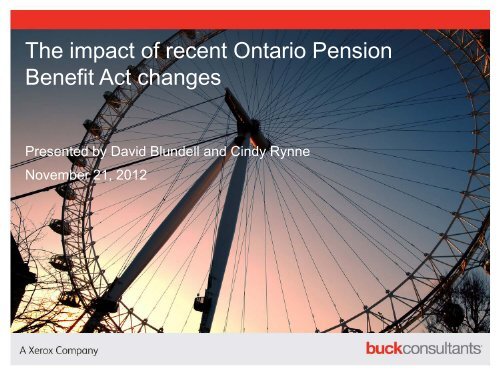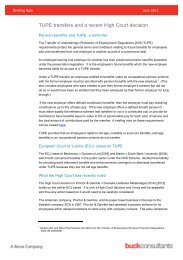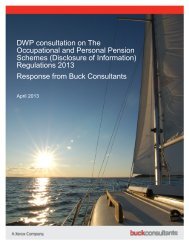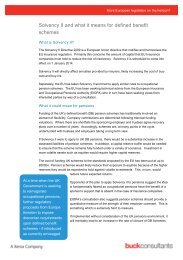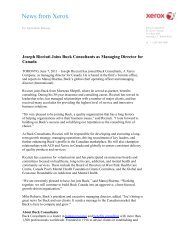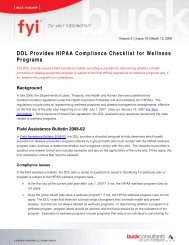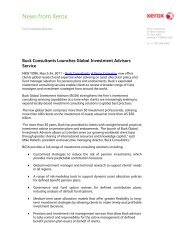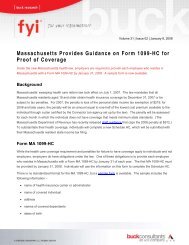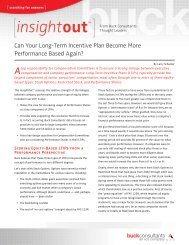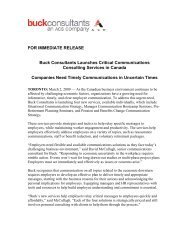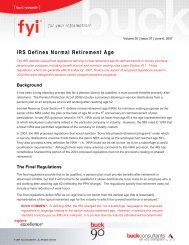The impact of recent Ontario Pension Benefit Act changes
The impact of recent Ontario Pension Benefit Act changes
The impact of recent Ontario Pension Benefit Act changes
You also want an ePaper? Increase the reach of your titles
YUMPU automatically turns print PDFs into web optimized ePapers that Google loves.
<strong>The</strong> <strong>impact</strong> <strong>of</strong> <strong>recent</strong> <strong>Ontario</strong> <strong>Pension</strong><br />
<strong>Benefit</strong> <strong>Act</strong> <strong>changes</strong><br />
Presented by David Blundell and Cindy Rynne<br />
November 21, 2012
November 21, 2012<br />
Agenda<br />
How we got here!<br />
What are the <strong>changes</strong><br />
Defined <strong>Benefit</strong> solvency relief<br />
FSCO-CAPSA activity<br />
Multi-jurisdictional pension plan agreement<br />
What’s next?<br />
2<br />
2012 <strong>Ontario</strong> <strong>Pension</strong> Changes
November 21, 2012<br />
How we got here!<br />
3<br />
2012 <strong>Ontario</strong> <strong>Pension</strong> Changes
November 21, 2012<br />
How we got here!<br />
1987 was the last major re-write <strong>of</strong> the <strong>Pension</strong> <strong>Benefit</strong>s <strong>Act</strong> (PBA) – ushered in 2 year<br />
vesting, 2 year eligibility, survivorship and death benefit protection, portability, enhanced<br />
funding protection<br />
2000 – last major amd’t <strong>of</strong> the<br />
PBA – equal treatment for<br />
common-law partners, samesex<br />
partners<br />
October 2008, “A Fine<br />
Balance” report released<br />
November 2006, the <strong>Ontario</strong> Expect Commission <strong>of</strong> <strong>Pension</strong>s was<br />
established. Its mandate was to examine<br />
‣ legislation that governs the funding <strong>of</strong> defined benefit pension<br />
plans,<br />
‣ the rules relating to pension deficits/surpluses, and<br />
‣ other issues relating to the security, viability and<br />
sustainability <strong>of</strong> the <strong>Ontario</strong> pension system.<br />
2010, two bills passed which<br />
amended the PBA. Bill 236<br />
and Bill 120<br />
July 1, 2012 many measures<br />
<strong>of</strong> Bill 236 put into force<br />
4<br />
2012 <strong>Ontario</strong> <strong>Pension</strong> Changes
November 21, 2012<br />
What are the <strong>changes</strong>?<br />
5<br />
2012 <strong>Ontario</strong> <strong>Pension</strong> Changes
November 21, 2012<br />
<strong>The</strong> <strong>changes</strong> are …….<br />
• Immediate vesting<br />
• Grow-in rules for defined benefit plans<br />
• Partial plan wind-ups<br />
• Small pension commutation<br />
• Disclosure <strong>of</strong> records<br />
• Electronic transmission <strong>of</strong> information<br />
• Member statement requirements<br />
6<br />
2012 <strong>Ontario</strong> <strong>Pension</strong> Changes
November 21, 2012<br />
Immediate vesting<br />
Details<br />
Effective July 1, 2012,<br />
• immediate vesting; and<br />
• locking-in<br />
<strong>of</strong> all earned pension benefits<br />
Applies to both DB and DC<br />
pension plans<br />
Does not apply to SERPs,<br />
DPSPs etc.<br />
Impact to plan sponsor<br />
Affects terminations, deaths,<br />
retirements and new hires on or<br />
after July 1, 2012<br />
Added administration for employers<br />
with high turnover<br />
Changes required to pension<br />
administration - systems, forms<br />
Update - booklets, annual pension<br />
statements, website portal<br />
Plan document amendments<br />
7<br />
2012 <strong>Ontario</strong> <strong>Pension</strong> Changes
November 21, 2012<br />
Immediate vesting - decisions<br />
Impact on hiring decisions<br />
• Maximum eligibility period is 2 years <strong>of</strong> continuous service<br />
• If current provision is
November 21, 2012<br />
Grow-in rules for defined benefit plans<br />
Change<br />
Right to “grow into”<br />
enhancements on termination:<br />
• Bridge benefits<br />
• Early retirement<br />
• Deemed consent<br />
Applies to involuntary<br />
terminations on or after July 1,<br />
2012 (see next slide)<br />
Previously, only applied on full or<br />
partial plan wind-ups<br />
Details<br />
If termination <strong>of</strong> employment is<br />
involuntarily and<br />
• if rule <strong>of</strong> 55 met - age & years <strong>of</strong><br />
continuous service or plan<br />
membership total 55+<br />
• member grows into any<br />
subsidized early retirement<br />
benefits and bridge benefits<br />
Exclusion for MEPPs and JSPPs if<br />
the plan elects<br />
9<br />
2012 <strong>Ontario</strong> <strong>Pension</strong> Changes
November 21, 2012<br />
Grow-in - application<br />
Applies to an involuntary termination <strong>of</strong> an <strong>Ontario</strong> employee<br />
• but does not include termination as a result <strong>of</strong> willful misconduct,<br />
disobedience or willful neglect <strong>of</strong> duty that is not trivial and has not<br />
been condoned by the employer (i.e. for cause)<br />
Also does not apply to<br />
• voluntary terminations<br />
• contract or temporary workers with a definite term or contract or on<br />
completion <strong>of</strong> a specific task<br />
• construction industry employees<br />
• an employee on temporary lay-<strong>of</strong>f per the ESA<br />
• defined contribution pension plans<br />
10<br />
2012 <strong>Ontario</strong> <strong>Pension</strong> Changes
November 21, 2012<br />
Grow-in …..<br />
Impact<br />
• <strong>Pension</strong><br />
administration<br />
processes/systems<br />
• Termination option<br />
forms<br />
• <strong>Pension</strong><br />
statements<br />
• Member records<br />
• Booklets<br />
• Plan text-<br />
RPP/SERP<br />
Considerations<br />
New concept - calculation methodology and the<br />
approach taken should be reviewed carefully based<br />
on plan specifics<br />
Tracking voluntary and involuntary terminations<br />
Potential for disputes over categorization <strong>of</strong><br />
termination<br />
Eliminate on a prospective basis those “grow-in”<br />
benefits – will help mitigate the cost <strong>of</strong> this new rule<br />
Be cognizant <strong>of</strong> salary continuance arrangements<br />
where minimum ESA requirements extend beyond<br />
July 1, 2012<br />
11<br />
2012 <strong>Ontario</strong> <strong>Pension</strong> Changes
November 21, 2012<br />
Partial wind-ups - elimination<br />
No partial plan wind-ups can be declared or ordered by the<br />
Superintendent for events occurring on and after July 1, 2012<br />
Events with effective dates occurring prior to July 1, 2012, will be<br />
governed by transitional rules<br />
• <strong>The</strong>se transitional rules are similar to the existing rules on partial<br />
wind-ups (i.e. immediate vesting and grow-in apply but not annuity<br />
purchases or surplus sharing)<br />
Plan document provisions that explicitly refer to a partial wind-up or a<br />
notional partial wind-up should be removed<br />
Applies to both defined benefit and defined contribution pension plans<br />
12<br />
2012 <strong>Ontario</strong> <strong>Pension</strong> Changes
November 21, 2012<br />
Partial wind-up - Plan sponsor - <strong>impact</strong><br />
Removes uncertainty surrounding reorganizations / plant<br />
closings occurring after July 1, 2012<br />
• Affected members treated as<br />
terminations (with grow-in)<br />
• No requirement to purchase immediate<br />
or deferred annuities<br />
• Minimal <strong>impact</strong> to defined contribution<br />
pension plans<br />
• Be wary <strong>of</strong> legacy situations prior to<br />
July 1, 2012 that could still be viewed<br />
as a partial wind-up<br />
13<br />
2012 <strong>Ontario</strong> <strong>Pension</strong> Changes
November 21, 2012<br />
Small pension commutation thresholds<br />
Thresholds have been revised ….<br />
Defined <strong>Benefit</strong> plans<br />
• Where the deferred pension is <<br />
4% <strong>of</strong> the YMPE in the year <strong>of</strong><br />
termination <strong>of</strong> employment, or<br />
• <strong>The</strong> CV <strong>of</strong> the deferred pension is<br />
< 20% <strong>of</strong> the YMPE in the<br />
year <strong>of</strong> termination <strong>of</strong> employment.<br />
Defined Contribution plans<br />
• <strong>The</strong> account value is < 20% <strong>of</strong> the<br />
YMPE in the year <strong>of</strong> termination <strong>of</strong><br />
employment.<br />
14<br />
2012 <strong>Ontario</strong> <strong>Pension</strong> Changes
November 21, 2012<br />
Small pensions – need to know<br />
• Plan texts<br />
• RRSP transfer<br />
• Survivor pensions<br />
• Defined benefit<br />
plans<br />
• Need to be amended before the higher<br />
thresholds can be used per FSCO especially<br />
DCPPs<br />
• An RRSP transfer option must be <strong>of</strong>fered for<br />
<strong>Ontario</strong> small pension commutations<br />
• Can be applied to survivor pension on death<br />
<strong>of</strong> retired member – but Plan text needs to<br />
authorize<br />
• Small pension transfer values exempted<br />
from CV transfer restrictions under OPBA<br />
15<br />
2012 <strong>Ontario</strong> <strong>Pension</strong> Changes
November 21, 2012<br />
Disclosure <strong>of</strong> records<br />
• Access<br />
• Fee<br />
• New disclosure<br />
items<br />
• Former spouse<br />
rights<br />
• Members may access records electronically<br />
or by mail (paper). Only certain records<br />
available electronically.<br />
• Maximum fee for<br />
• paper copies is 25 cents per page<br />
• electronic records $5 for each request<br />
• <strong>Act</strong>uarial Information Summaries and other<br />
investment information summaries<br />
• Limited access for Family Law purposes<br />
16<br />
2012 <strong>Ontario</strong> <strong>Pension</strong> Changes
November 21, 2012<br />
Electronic transmission <strong>of</strong> information<br />
Details<br />
Electronic communication<br />
consists <strong>of</strong>:<br />
• delivery <strong>of</strong> pension<br />
statements, notices, reports<br />
and other prescribed<br />
documents to members and<br />
beneficiaries<br />
• maintenance <strong>of</strong> corporate<br />
intranet or secure internet<br />
website where member can<br />
access plan information<br />
Impact to plan sponsor<br />
• Explicit or implied member<br />
consent must be obtained<br />
• Disclosure <strong>of</strong> member rights must<br />
be made<br />
• Universal consent likely not<br />
achievable<br />
• Longer term project – obtaining<br />
consent and deciding on which<br />
documents could be delivered<br />
electronically<br />
• Legal input on consent may be<br />
needed<br />
17<br />
2012 <strong>Ontario</strong> <strong>Pension</strong> Changes
November 21, 2012<br />
Statements requirements<br />
Details<br />
Minor adjustments to<br />
statement content<br />
requirements<br />
Statement content<br />
should be reviewed<br />
Small pension<br />
statement - NEW<br />
Impacts<br />
• Annual statement<br />
• Termination benefit – deferred statement<br />
• Death/Survivor benefits statement<br />
• Small pension statement<br />
• No periodic inactive-retiree statements yet!<br />
18<br />
2012 <strong>Ontario</strong> <strong>Pension</strong> Changes
November 21, 2012<br />
Defined benefit plan<br />
solvency relief<br />
19<br />
2012 <strong>Ontario</strong> <strong>Pension</strong> Changes
November 21, 2012<br />
Solvency relief for defined benefit pension plans<br />
Temporary measures<br />
• Consolidation <strong>of</strong> existing solvency payment schedules into a new<br />
longer five-year payment schedule<br />
• Extend the solvency payment schedule up to 10 years (from the<br />
current maximum <strong>of</strong> five years) for new solvency deficiency subject<br />
to plan beneficiary consent<br />
Permanent measures<br />
• Permit solvency and going concern special payments to be<br />
amortized beginning one year after a plan valuation date<br />
• Permit the use <strong>of</strong> irrevocable letters <strong>of</strong> credit issued by financial<br />
institutions to cover up to 15% <strong>of</strong> a plan’s solvency liabilities<br />
20<br />
2012 <strong>Ontario</strong> <strong>Pension</strong> Changes
November 21, 2012<br />
FSCO-CAPSA activity<br />
21<br />
2012 <strong>Ontario</strong> <strong>Pension</strong> Changes
Management and Retention <strong>of</strong> <strong>Pension</strong> Plan Records<br />
November 21, 2012<br />
• FSCO Policy A300-200 – Management and Retention <strong>of</strong> <strong>Pension</strong> Plan Records by the<br />
Administrator which discusses responsibilities <strong>of</strong> plan administrator (PA) and provides<br />
guidance for prudent records management and retention practices<br />
• FSCO recommends that PA have a written internal policy<br />
• PA has duty and standard <strong>of</strong> care under OPBA<br />
• Complete and accurate records are needed to discharge PAs duty and standard <strong>of</strong><br />
care under the act<br />
• FCSO principle is that records should be kept as long as an entitlement is being paid<br />
after which a summary <strong>of</strong> the individual’s records should be retained<br />
22<br />
2012 <strong>Ontario</strong> <strong>Pension</strong> Changes
Management <strong>of</strong> Inquiries and Complaints from Plan<br />
Beneficiaries<br />
• FSCO Policy A300-450 – Administrator’s Management <strong>of</strong> Inquiries and Complaints<br />
from Plan Beneficiaries which clarifies the responsibilities <strong>of</strong> the plan administrator (PA)<br />
<strong>of</strong> a pension plan in responding to inquiries and complaints from plan beneficiaries<br />
• FSCO recommends that PA have a written internal policy setting out roles and<br />
responsibilities<br />
November 21, 2012<br />
• FSCO expects a response to be provided within 30 days. Where services delegated to<br />
a 3 rd party, PA is still responsible for ensuring inquiry is dealt with per plan terms,<br />
OPBA<br />
23<br />
2012 <strong>Ontario</strong> <strong>Pension</strong> Changes
November 21, 2012<br />
FSCO website – <strong>recent</strong> postings<br />
• New Plan member portal – A Guide to Understanding Your <strong>Pension</strong> Plan<br />
• FSCO webinar in December on a Plan Administrator's Obligations on Termination <strong>of</strong><br />
Employment<br />
• A plan beneficiary may request that the Financial Services Commission <strong>of</strong> <strong>Ontario</strong><br />
(FSCO) review his/her pension issue if he/she unable to gain satisfaction.<br />
• If a plan beneficiary disagrees with FSCO’s conclusion, but does not have any new<br />
information to support his/her position or request, he/she may request that the<br />
Superintendent issue an Order (a written directive that requires an administrator to<br />
take an action, or refrain from taking an action, in respect <strong>of</strong> a pension plan).<br />
24<br />
2012 <strong>Ontario</strong> <strong>Pension</strong> Changes
November 21, 2012<br />
CAPSA activity<br />
July 2012, draft Defined Contribution <strong>Pension</strong> Plan Guideline<br />
Comment period for pension stakeholders ended on November 1, 2012<br />
Supplements the best practices in CAPSA Guideline No. 4 relating to<br />
DCPPs<br />
Summary ....<br />
• Members responsible for investment choice and using decision<br />
making tools and obtaining qualified investment advice<br />
• PAs responsible for providing information to members to help them<br />
understand and estimate their retirement benefits<br />
• Specifically, PAs should consider providing an estimate <strong>of</strong> what each<br />
member's account value will provide at retirement and an annual<br />
estimate based on the accumulated account balance<br />
25<br />
2012 <strong>Ontario</strong> <strong>Pension</strong> Changes
November 21, 2012<br />
CAPSA activity (cont)<br />
• PAs to disclosure if the plan will provide an adequate retirement<br />
income in conjunction with govt benefits in the form <strong>of</strong> a targeted<br />
pension for each member<br />
• PAs should provide members with information to assist them in<br />
making informed decisions in both the accumulation and payout<br />
phases<br />
PAs may already voluntarily provide support to members in some way<br />
BUT DC plan sponsors should be concerned about what the finalized<br />
guideline looks like<br />
26
November 21, 2012<br />
Multi-jurisdictional<br />
pension plan<br />
agreement<br />
27<br />
2012 <strong>Ontario</strong> <strong>Pension</strong> Changes
November 21, 2012<br />
What is the MJPPA?<br />
An agreement between Canadian Regulators which allows for the<br />
efficient administration <strong>of</strong> pension plans that have members in more<br />
than one pension jurisdiction<br />
Once fully in force the MJPPA will replace the 1968 Memorandum <strong>of</strong><br />
Reciprocal Agreement and ….<br />
• Delegate authority and responsibility to the major authority<br />
• Require that certain minimum legislative requirements default to the<br />
major authority’s legislation<br />
• Require the Regulators to abide by the agreement<br />
No national agreement means that pension plans would need to register<br />
in each jurisdiction in which they have members<br />
28<br />
2012 <strong>Ontario</strong> <strong>Pension</strong> Changes
November 21, 2012<br />
Who has signed the MJPPA?<br />
So far only Québec and <strong>Ontario</strong> with effect from<br />
July 1, 2011<br />
• Other jurisdictions are expected to sign<br />
over the coming months-years<br />
• Many jurisdictions have passed<br />
amendments to their PBA to authorize<br />
• Until MJPPA signed, the 1968<br />
agreement still applies to those<br />
jurisdictions who haven’t signed<br />
• In the meantime, transitional measures<br />
apply<br />
29<br />
2012 <strong>Ontario</strong> <strong>Pension</strong> Changes
November 21, 2012<br />
Conclusion<br />
• While many practices have not changed there are some areas that<br />
we need to pay attention to (i.e. member statement requirements)<br />
• Only two jurisdictions have adopted but many others are poised to do<br />
so<br />
• Will be a challenge for multi-jurisdictional pension plans during<br />
transition<br />
• AIR membership accuracy becomes even more important going<br />
forward – expect AIR forms to change in the future<br />
30<br />
2012 <strong>Ontario</strong> <strong>Pension</strong> Changes
November 21, 2012<br />
What’s next!<br />
31<br />
2012 <strong>Ontario</strong> <strong>Pension</strong> Changes
November 21, 2012<br />
What’s Next …<br />
• Remaining provisions <strong>of</strong> Bills 236 and 120 need to be put into force<br />
• Major <strong>changes</strong> outstanding<br />
• Codification <strong>of</strong> plan administrator’s right to charge certain fees<br />
and expenses to pension fund<br />
• Codification <strong>of</strong> plan administrator’s right to take contribution<br />
holidays<br />
• New advance disclosure requirements <strong>of</strong> plan amendment<br />
<strong>changes</strong><br />
• Periodic inactive-retiree statements<br />
• Plan design innovation – periodic payts from DC plan, new style<br />
DB plans<br />
32<br />
2012 <strong>Ontario</strong> <strong>Pension</strong> Changes
November 21, 2012<br />
Plan design innovation<br />
• Target <strong>Benefit</strong> Plans<br />
• Currently contributions fixed by collective agreement<br />
• Legislation needs to expand coverage to non-union environments<br />
• Provides cost certainty to Employers<br />
• Members share the risk <strong>of</strong> attaining the target benefit<br />
• No solvency funding but benefits have to be aligned with assets<br />
• No <strong>Pension</strong> <strong>Benefit</strong> Guarantee Fund coverage nor funding<br />
33<br />
2012 <strong>Ontario</strong> <strong>Pension</strong> Changes
November 21, 2012<br />
Conclusion<br />
• Change to date is mostly member friendly<br />
- Plan members will need to become more engaged on how their plans<br />
deliver benefits to them<br />
- Sponsors will need to better communicate the “pension deal” to<br />
members<br />
• Final thoughts …<br />
- DC pension plans can expect not only increased levels <strong>of</strong> compliance<br />
but increased costs to comply<br />
- DB pension plans as we know them will need to innovate to survive<br />
and manage risk<br />
34<br />
2012 <strong>Ontario</strong> <strong>Pension</strong> Changes
November 21, 2012<br />
QUESTIONS<br />
David Blundell, 416-644-9293<br />
david.blundell@buckconsultants.com<br />
Cindy Rynne, 416-644-9290<br />
cindy.rynne@buckconsultants.com<br />
35<br />
2012 <strong>Ontario</strong> <strong>Pension</strong> Changes


